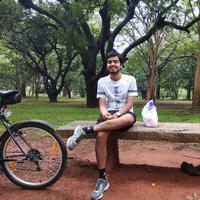
Back-Story
Hello guys, today I had a great opportunity to interview Abin Alex Pothen. He has done his BTech in Mechanical from NITK. He was an executive member of IEEE and SIGHT Chair in 2015. He is currently a Project Assistant at IISc and is working on non-linear control. With the amount of experience he possesses and the ‘air of intelligence’ he creates around the person he is interacting with, it was a great opportunity for me.
What is one thing you want mechanical students to remember?
That question can be answered in two parts. First, academics and then placements. Regarding academics, one important thing that comes into my mind is that our curriculum is inadequate for higher level understanding of subjects. We need to take online courses, talk to people, attend lectures and so on. Don’t just stick to what you learn in class, but apply what you learn by doing projects to get an edge over the others especially when you are applying for a research-based MS programme. The second aspect is about placements. Most mechanical jobs are not actually “mechanical” in nature. There might be few companies which provide core mechanical jobs, but most don’t. And that is why many choose to go abroad to get an MS. So from that perspective, you need a good CGPA (> 8) to put up an application for a job in India and additional undergraduate projects to support your application for MS abroad; places like Germany are great. For people interested in research based masters/direct PhD, keep your pointer high, above 9.
Mechanical Engg. being a very broad field, how do we find our area of interest?
I can recall my experience. When I was in first year, I wanted do to aerodyanamics. With that in mind, I started looking deep into fluid dynamics. I also took up online courses and read Anderson’s book on aerodynamics. But, in second year, I realised that fluid mechanics wasn’t for me. I wasn’t enjoying what I was doing. Soon, I began taking further online courses to broaden my perspectives. I took up coures related to dynamics and control. Then, robotics seemed to be a prospective option to explore. I was subsequently part of the quadcopter project in IEEE, wherein I worked on parameter estimation. That really helped me learn the practical applications before I went into the theoretical aspects. After that, I stepped into dynamics and online courses helped me here. So for people confused, keep working on what you think is presently your ‘right’ area and eventually, you’ll find what you’re really good.
How was your experinece in the Quadcopter Team?
My interest towards robotics was kindled by this team project. I was made to work on the CAD model of the quadcopter and estimate parameters for the control system. This work got me interested in exploring dynamics. I started looking into differential equations, specifically the Newton’s method and Lagrangian method. Now I am in IISc because of that quadcopter project.
How do we go about inter-disciplinary research?
To start off, you have to get into the field of research. It is hard because it is not what the herd does. A lot of my peers took up corporte jobs and that scared me about my choices of going for a research position at IISc. In a corporate setting, things are valued when there is demand for it. But research is quite the opposite. While working on a problem, you’re the first one there. If there is someone else working on the same problem, you wouldn’t work on it. Coming to inter-disciplinary research, we cannot start off with everything at once. That’s the first thing to keep in mind. Start with a field you are good at and go deeper. As you dwell deep, you’ll see that the field starts diverging. Be open to expand into other domains and you’ll see that you have stepped into inter-disciplinary research. It is the same for every filed as ‘digging deeper’ ends up in mathematics, which can be applied to diverse fields.
How is life at IISc? How is it different from NITK?
IISc is great! In NITK there was no rest; We had to work even on weekends. The IISc culture is more relaxed and as long as you publish papers, you’re okay! There are no time restrictions. Plus, the environment is great. Everyone is motivated and people will help you out in getting quality research. As cliche as it may sound, your work is ‘exposed to the world’. A few days back one of the professors whom I emailed to told me that he had read my work. What’s a better complement than that? This is the quality of work that is done here. Another thing about IISc is the structure of funding. There’s less administrative work for project positions. In short, if you are looking for a good research experience, IISc is a great place.
What is your current research interest?
I am currently working on non-linear control. I started with unmanned aerial vehicles and the way it is guided to achieve a specific task. While I was an undergraduate, I would come here (IISc) to develop new methods for guidance and got interesting results on some faster methods for UAV convergence. That’s where it started and now it has moved to path planning for robots in obstacle environment, which is an interesting challenge that a lot of robotiscists are looking into. Currently, I am looking at stability of systems and also the stability of societies that is more philosophical!
That was the end of the interview.
Abin and us had just the one year of overlap in undergrad, yet managed to share key insights about research that we still use today. The quadcopter his team built won the Student Exemplary Award for the IEEE NITK Student Branch and still funds the club today. If we could only take only one message from Abin, it would be to keep reminding ourselves to take proper rest. Nothing will come in a day, nothing will come when you’re tired. Continual work will only drain yourself and you need to charge yourself that often. Results will come, they will come in plenty! All you need is patience.
